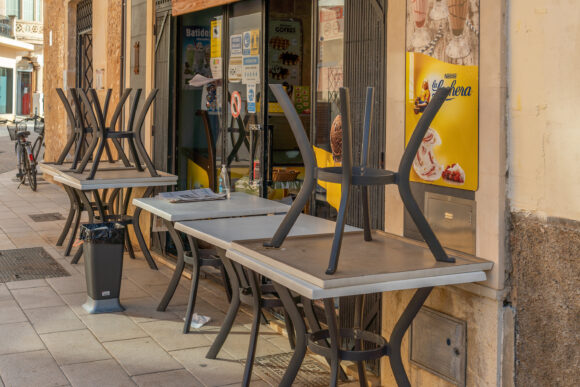A group of North Carolina restaurants and an industry group are asking the North Carolina Supreme Court to bypass the Court of Appeals and take up an insurer’s appeal of a trial court decision that found coverage was owed for COVID-19 business interruptions.
“Because this court has never ruled on the scope of the phrase ‘physical loss or physical damage,’ and because the issue has taken on sudden and widespread relevance for the North Carolina business community, definitive guidance from this Court is urgently needed,” states a petition for discretionary review filed last Thursday by attorneys for North State Deli.
North State was the lead plaintiff in a group of 16 restaurants that filed a lawsuit seeking coverage for COVID-related business income losses. It was a rare winner in a battle that has been fought at courthouses across the country in the past year, mostly decided in favor of insurers.
Durham County Superior Court Judge Orlando F. Hudson Jr. ruled on Oct. 7 that the government orders that closed restaurants to prevent the spread of coronavirus amounted to a direct physical loss that was covered by the policy issued by Cincinnati Insurance Co. He granted partial summary judgment in the restaurants’ favor.
Cincinnati appealed the decision, prompting North State to ask the Supreme Court to skip the intermediate steps and take up the case directly. The North Carolina Restaurant and Lodging Association filed an amicus brief supporting the motion.
The association said hotel room revenues dropped 41% in 2020 from the previous year and restaurants sales were down 29% on average.
“In short, expeditious resolution of this litigation will have a ripple effect on resolving coverage disputes – and potentially saving businesses in North Carolina,” the brief says.
A litigation tracker maintained by the University of Pennsylvania shows that North State was the only plaintiff to win among sixcases decided in North Carolina so far. Insurers have had similar successes in most states.

Attorney Gagan Gupta, with Paynter Law in Raleigh, said he pleaded North State’s case differently than many other policyholder attorneys. The lawsuit alleges that the government closure orders themselves caused the physical loss of property, while other attorneys pleaded that damage was caused by SARS-CoV-2 being present on the premises.
North Carolina’s closure orders were also different than closure orders in other states, Gupta said. Business owners were prohibited from accessing their properties in North Carolina, while in other states the orders prohibited customers from entering.
Gupta said most of the 16 restaurants he represents were forced to close for at least six months and up to one year. Collectively they have likely lost $15 million in business income, he said, acknowledging that he does not yet have a formal accounting.
Gupta said he has been told that the Supreme Court receives about 30 bypass petitions such as his in a year but grants only three to six of them. He said he’s hoping that the significance of the question and the urgent need for businesses to recoup lost income will persuade the justices that a direct appeal is appropriate.
He said it doesn’t hurt that Cincinnati Insurance itself supported a petition asking the Ohio Supreme Court to intervene in a similar case that was filed at the U.S. District Court in Youngstown. The Ohio high court in October voted 4-3 to accept a certified question from the federal judge to clarify the meaning of direct physical loss.
Gupta said he doesn’t know where the insurer will stand on his petition for direct state Supreme Court review. Attorneys for Cincinnati did not reply to a request for comment.
The University of Pennsylvania litigation tracker shows that appeals in 160 COVID business interruption cases have been filed at federal Circuit Courts of Appeal and 29 have been filed in state appellate courts. None of the appellate courts has yet issued a decision, but some have heard oral arguments.
Was this article valuable?
Here are more articles you may enjoy.


 Credit Suisse Nazi Probe Reveals Fresh SS Ties, Senator Says
Credit Suisse Nazi Probe Reveals Fresh SS Ties, Senator Says  Portugal Rolls Out $2.9 Billion Aid as Deadly Flooding Spreads
Portugal Rolls Out $2.9 Billion Aid as Deadly Flooding Spreads  Tesla Sued Over Crash That Trapped, Killed Massachusetts Driver
Tesla Sued Over Crash That Trapped, Killed Massachusetts Driver  Cape Cod Faces Highest Snow Risk as New Coastal Storm Forms
Cape Cod Faces Highest Snow Risk as New Coastal Storm Forms 